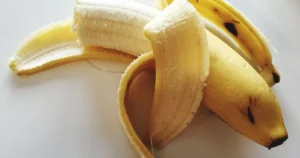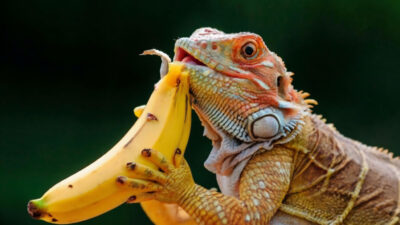Are you curious about whether your beloved bearded dragon can indulge in a sweet treat like bananas? “Can bearded dragons eat banana?” is a common question among reptile enthusiasts, and it’s essential to explore the answer.
Bearded dragons, with their varied diet preferences, might seem like they’d enjoy a banana now and then. But before you toss one into their enclosure, it’s crucial to understand the implications.
In this article, we’ll dive into the topic and uncover whether bananas are a suitable addition to your bearded dragon’s menu. So, can bearded dragons eat banana? Let’s find out together.
Key nutrients required by bearded dragons

Bearded dragons are omnivorous reptiles, meaning they eat a combination of plant matter and animal protein. Providing a well-rounded diet is crucial to ensure they receive all the necessary nutrients for optimal health. Here’s an explanation of the key nutrients they require:
- Protein: Bearded dragons need protein for growth, muscle development, and overall health. In the wild, they primarily consume insects. Common insect options include crickets, mealworms, Dubia roaches, and silkworms. It’s essential to offer a variety of insects to provide a diverse protein profile.
- Calcium: Calcium is vital for bone strength and preventing metabolic bone disease, a common ailment in captive reptiles. Bearded dragons require a calcium-rich diet to maintain healthy bones and proper bodily functions. Calcium sources include dark leafy greens like collard greens and mustard greens, as well as calcium supplements. Dusting insects with calcium powder before feeding them to your bearded dragon can ensure they receive an adequate calcium intake.
- Vitamin D3: Vitamin D3 is necessary for calcium absorption and utilization. Bearded dragons synthesize vitamin D3 in their skin when exposed to UVB light. Therefore, it’s crucial to provide them with access to proper UVB lighting in their enclosure. Without sufficient UVB exposure, they may develop deficiencies even if their diet contains enough calcium.
- Fiber: Fiber aids in digestion and helps prevent constipation. While bearded dragons are primarily carnivorous as juveniles, they gradually incorporate more plant matter into their diet as they mature. Fibrous vegetables like squash, bell peppers, and carrots provide essential fiber for digestive health.
- Vitamin A: Vitamin A is essential for vision, skin health, and immune function. Dark leafy greens such as kale, collard greens, and dandelion greens are excellent sources of vitamin A. Additionally, orange vegetables like carrots and sweet potatoes contain beta-carotene, a precursor to vitamin A.
- Water: Although not a nutrient per se, water is crucial for maintaining hydration and overall health. Bearded dragons should have access to clean, fresh water at all times. Some individuals may prefer drinking from a shallow dish, while others may drink water droplets from plants or be misted with water.
Providing a balanced diet that includes a variety of protein sources, calcium-rich foods, vitamin-rich vegetables, and access to UVB lighting and water will help ensure the health and well-being of your bearded dragon.
Potential health issues from an imbalanced diet
When a bearded dragon’s diet isn’t balanced, it can lead to a host of health problems, just like how eating too much junk food can make us feel lousy. Here’s what might happen:
- Weak Bones (Metabolic Bone Disease): Imagine if you didn’t get enough calcium or vitamin D in your diet. Your bones would become weak, brittle, and could even break easily. That’s what happens to bearded dragons if they don’t get the right balance of calcium, phosphorus, and vitamin D3. It’s like having the building blocks for their bones but not enough cement to hold them together.
- Pudgy Dragons (Obesity): Eating too much of the wrong stuff, like fatty insects or sugary fruits, can make bearded dragons chubby. Just like in humans, carrying around extra weight isn’t healthy for them. It can put a strain on their organs, making it harder for them to move around and stay active.
- Sick Insides (Gastrointestinal Issues): If a bearded dragon’s diet lacks enough fiber from veggies, they might end up constipated or even have blockages in their gut. It’s like trying to drive a car without enough gas—it just won’t go smoothly.
- Trouble with Teeth: Just like us, bearded dragons need to chew their food properly. If they don’t get enough fibrous veggies to munch on, their teeth can overgrow or become misaligned. That’s a bit like when we don’t brush our teeth enough and end up with dental problems.
- Reproductive Woes: If female bearded dragons don’t get the right nutrients, they might have trouble laying eggs properly, which can be painful and dangerous. Males might also have trouble reproducing if they’re not getting the vitamins and minerals they need.
- Overall Weakness: Without a balanced diet, bearded dragons might not have enough energy or the right nutrients to keep their bodies working well. It’s like trying to run a marathon without eating breakfast—it’s just not going to go smoothly.
To keep your scaly friend healthy and happy, make sure they’re getting a good mix of bugs, leafy greens, and the occasional treat. And just like how we need check-ups at the doctor, it’s a good idea to take them to the vet regularly to make sure everything’s A-OK.
How bananas compare to the nutritional needs of bearded dragons
Bearded dragons have very different nutritional needs compared to humans, so comparing them to bananas is quite different. Bearded dragons are omnivorous reptiles and require a balanced diet of protein, vegetables, fruits, and occasional treats. Bananas can be offered to bearded dragons as a treat occasionally, but they should not make up a significant portion of their diet due to their high sugar content.
Also, bearded dragons require a diet rich in calcium and vitamin D3 for proper bone growth and health. They also need a variety of vegetables like collard greens, kale, and mustard greens for vitamins and minerals. Additionally, they need protein from sources like insects (crickets, mealworms, etc.) and occasionally small amounts of fruits like berries or papaya for variety and some additional nutrients.
In summary, while bananas can be given to bearded dragons occasionally as a treat, they should not be a staple food due to their high sugar content. It’s essential to provide a balanced and varied diet to ensure their nutritional needs are met.
Can Bearded Dragons Eat Bananas?


